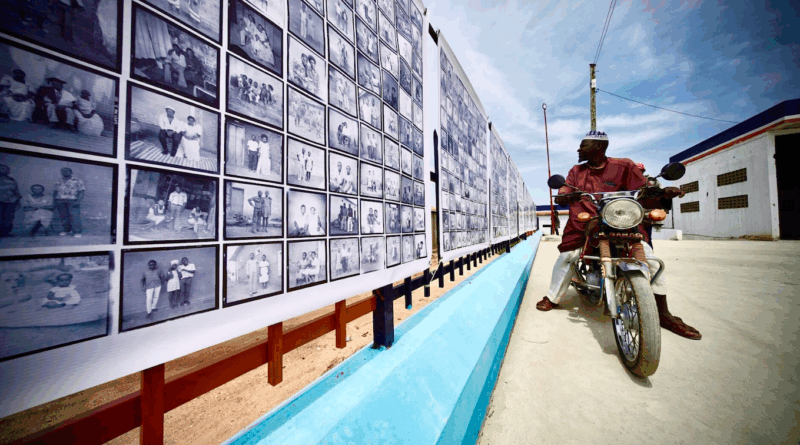INTERVIEW: Kibaate Aloysius Ssalongo comes into focus
Photo: Memories of Love Returned showcases the work of photographer Kibaate Aloysius Ssalongo. Photo courtesy of NY African Film Festival / Provided by CDC PR News with permission.
When Ntare Guma Mbaho Mwine, an actor, photographer and filmmaker, was traveling back home to Kampala, Uganda, in 2002, he had no idea that the next few minutes of his day would forever change his career and life. He was with his family, and the car started to overheat, with smoke billowing from beneath the hood. Mwine was in an unfamiliar town called Mbirizi, and the landscape, he said, looked like an old cartoon, with storefronts on the main road and then nothing else for miles and miles.
That’s when Mwine saw a photography studio amongst the storefronts. A simple sign read Photo Studio, and he decided to head inside. Within those walls the actor met Kibaate Aloysius Ssalongo, a rural photographer who had an archive of images that spanned nearly 50 years. Mwine was amazed by what he found, and soon a friendship emerged and a creative project began in earnest.
That project, more than 20 years in the making, is the new documentary Memories of Love Returned, with Mwine serving as the director. The film is the centerpiece of the 32nd New York African Film Festival at Film at Lincoln Center, which runs through May 13. Mwine will offer a Q&A following a screening of the documentary on Saturday, May 10, at 6:30 p.m.
“It was pretty immediate,” Mwine said in a recent phone interview. “When I saw his studio and saw the mass of work that he had, I really felt like I had stumbled on a goldmine. As a photographer myself, I hadn’t seen such an archive spanning five decades. Unfortunately it took me a couple decades to put the whole project together, but I did feel like right away when I met him, it was really special. I didn’t know it was going to turn into a documentary. I didn’t know it would take me 22 years to share his work in this way, but it did feel like an aha moment when we met.”
Mwine described Ssalongo as a rural photographer who was well known within his community, but someone who never exhibited his work publicly. He’d take pictures of his clients, give them the photographs and hold on to the negatives. It was a fulfilling life, but not one with great fame and fortune, even though his engaging imagery immediately captures the eye.
“He was known in the community but not internationally,” he said. “And the film at this point has now screened on three continents, has won multiple awards around the world, and it’s coming to New York. It feels like this has been a great way for people around the globe to get to know his work, and I’m excited that it’s coming to New York for the first time.”
Mwine added: “One of the things that jumped out for me immediately is his ability to capture moments of intimacy. I hadn’t seen such moments of intimacy between people on film like this before, coming from rural communities. Usually photographs that have made the headlines or crossed the borders from the continent — Malick Sidibé, Seydou Keïta — are celebrated through the aristocrats or the upper-class from the capital cities, or there’s plenty of photographs capturing moments of strife and turmoil. This was, for me, the first time I was seeing moments of intimacy between friends, lovers, family members that spanned over five decades. That’s what was really special about his work.”
One of the reasons that Ssalongo’s photography didn’t gain a following beyond Mbirizi was because the images were created on film and didn’t have the advantage of being shared on the internet. The photographer also died in 2006 and never experienced the great interest that eventually came to his work.
“But now through this film, people are understanding the talents he had, the breadth and scope of his work, and I think it’s the wonders of modern technology that this film can be seen around the globe,” Mwine said. “I had written a multimedia solo performance play, which incorporated some of his photographs in the piece, and that play came to New York. It made The New York Times Critics Pick list. It was at the Public Theater, and I traveled around the world with it. So [Ssalongo] was aware of that, but we wanted to do a book. And we wanted to get his work out in the gallery world, but unfortunately that didn’t happen before he passed.”
The director added: “I didn’t realize the cost of digitizing tens of thousands of images of his negatives, and so I sat on them for over 10 years because I couldn’t afford to digitize them all. Unfortunately he passed in that time, but I’m so grateful that I somehow managed to pull it off and digitize his work. I went back to the community, found the people he photographed. We photographed them, caught their stories about him, uncovered all these family secrets and lore about him, and it’s all in the film.”
By John Soltes / Publisher / John@HollywoodSoapbox.com
Memories of Love Returned, directed by Ntare Guma Mbaho Mwine, will be screened at the 32nd New York African Film Festival at Film at Lincoln Center on Saturday, May 10, at 6:30 p.m. Mwine will offer a Q&A following the screening. Click here for more information and tickets.

